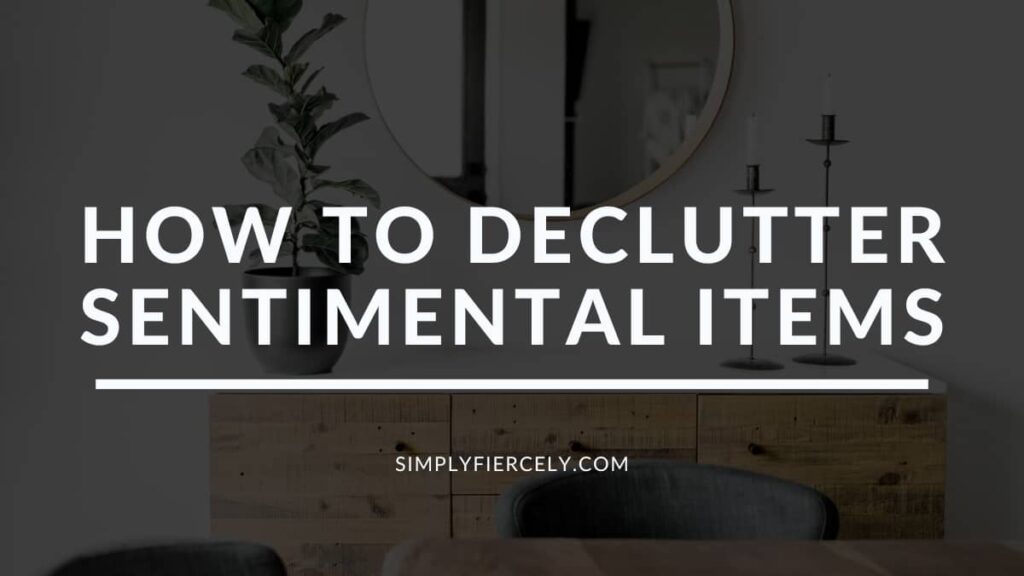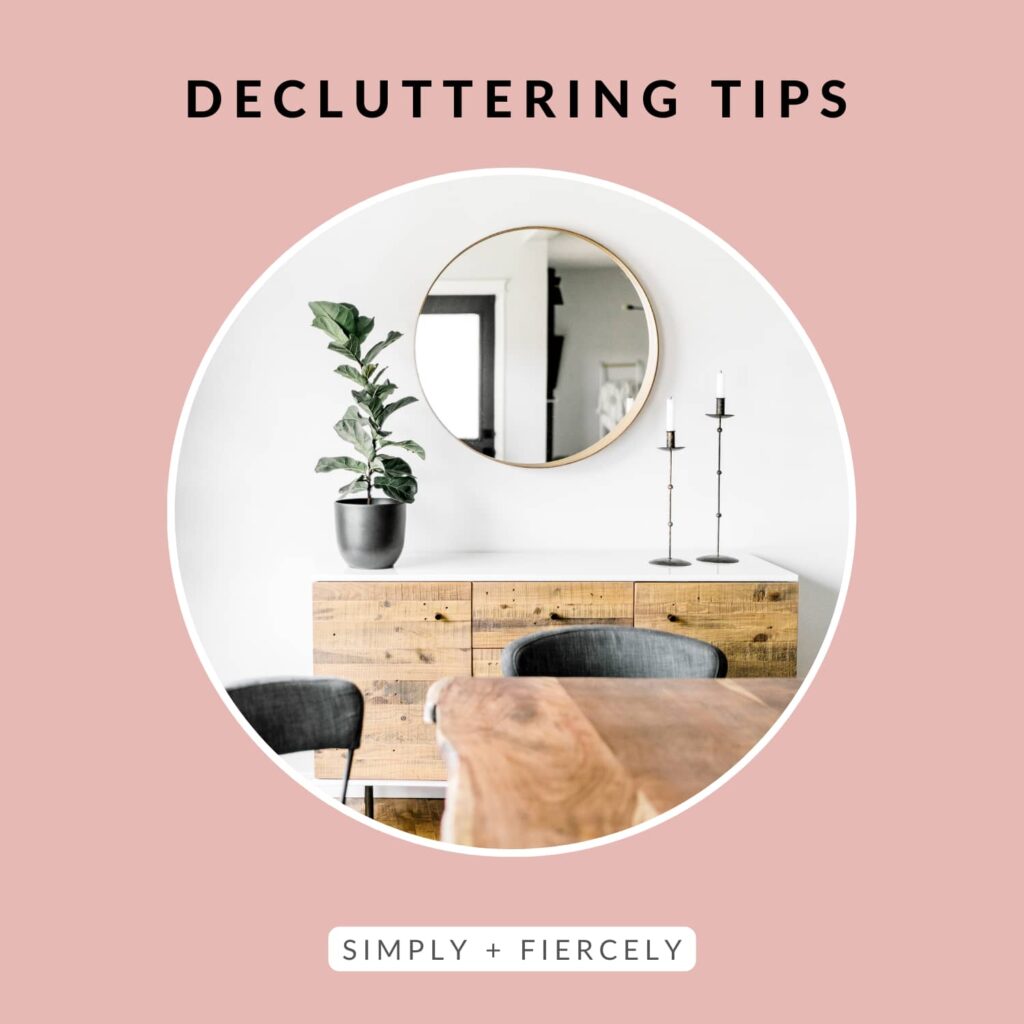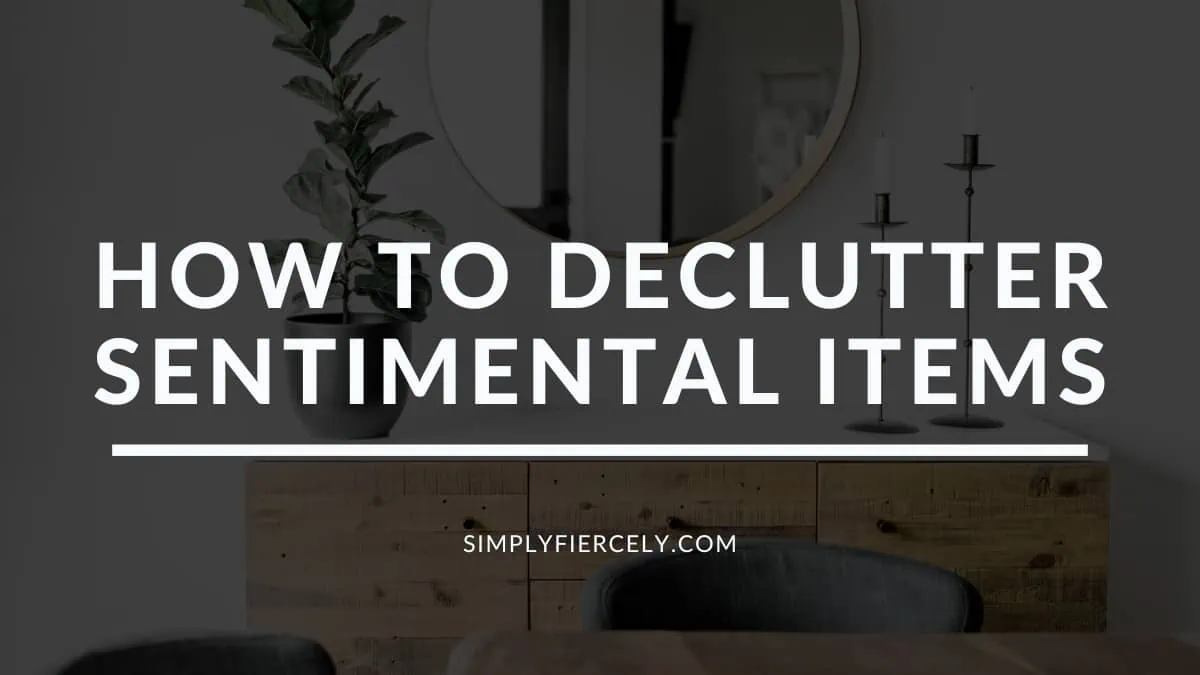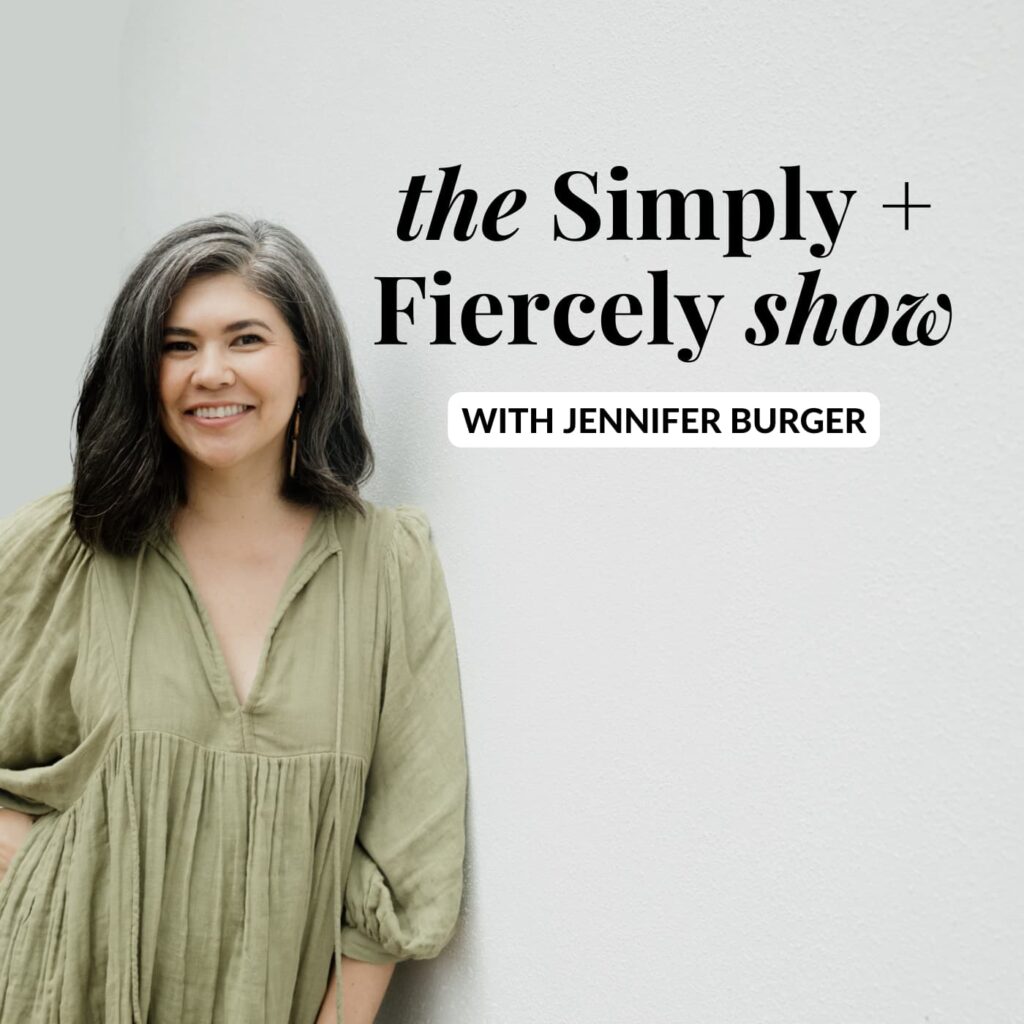Inside: Do you have boxes of sentimental items you’d love to clear … but just can’t let go of? Here are some tips that will make decluttering easier.
This might surprise some people because I’m a minimalist, and we don’t exactly have a reputation for being sentimental. But if we sat down for a coffee, you’d soon learn I’m one of the most emotional people you’d ever meet.
I cry over TV commercials, apologise to my houseplants, and feel a deep emotional attachment to stuff, which means my decluttering journey has been far from easy! But over the years, I’ve learned a few things about letting go, which I’m going to share in this blog post.
If you want to carve out space in your home and mind but find it hard to let go of sentimental objects, don’t despair. There are ways to declutter—kind, compassionate ways that respect your stories and your past.
So, cozy up, find a comfortable spot, and let’s get started!

Your Stuff is NOT Just Stuff
Before we dive into what works, I want to quickly touch on what doesn’t (or at least, what didn’t work for me!).
If you’ve read much about decluttering sentimental things, you’ve probably already heard some version of the following advice:
Your memories live in your heart, not in your belongings. It’s just stuff.
Have you ever heard this before?
It makes sense in theory … but the more I learn about decluttering, the less I believe it. You’re not defined by what you own, but almost everything tells a story:
- About how you’ve been hurt …
- About what you wish you could change …
- About your definition of success …
- About ways you think you’re not good enough …
- About what you’re still grieving…
Of course, these stories aren’t physically in our possessions, but denying their existence altogether isn’t helping anyone. Instead, it only shames people who struggle to get rid of stuff, which in turn makes decluttering even harder to do.
So let’s change the narrative. Instead of pretending our stories don’t matter, let’s get curious and see where it takes us.
How to Declutter Items With Sentimental Value
If you have sentimental items you want to declutter—anything from baby clothes to old photos and everything in between—I encourage you to start by putting a name to your emotions.
Let me explain with an example. Let’s say you want to declutter a vase your grandmother gave you years ago.
On the surface, you might think this vase is hard to declutter because it reminds you of your grandmother—but let’s take a closer look.
What exactly are those memories?
- Do you feel guilty about not spending more time with your grandmother?
- Was your grandmother the person you turned to during hard times?
- Are you nostalgic for the person you used to be when you were around your grandmother?
This might sound like I’m splitting hairs, but I’ve learned that before you can declutter a physical item, you need to understand exactly where the emotional attachment comes from and then deal directly with those emotions.
This might mean forgiving yourself for not spending more time with your grandmother, creating a new support network, or perhaps even grieving for a part of yourself that no longer exists.
This can be hard to do (which is why it’s tempting to keep and hide behind our clutter), but I promise you it’s worth it. It’s how you unlock the full benefits of decluttering, which are as much about personal growth as creating a spacious and easily tidied home.
So go slow when you need to. If you’re a sentimental person, you probably differ from others, and that’s OK! It took me many years to declutter. I had a lot of baggage to deal with (physically and emotionally), and it was one of the hardest things I’ve ever had to do.
But when you finally let go, there’s a lightness of spirit—like releasing a weight you didn’t realise you were carrying.
Related Post: How to Declutter When You Regret Spending Money
You Don’t Have to Declutter Things That Bring Good Memories
Another reason I like to put a name to my emotions is because it’s OK to keep things for sentimental reasons! Everyone is different, but for me—if you own something and it brings you joy, then it’s not clutter.
Despite what you may have seen on the Internet, minimalism is not one size fits all, and you’re not breaking the rules if you keep a few special items that remind you of precious memories. I have a few decorative things on my dresser that other people would consider useless, but they make me smile, and that’s good enough for me to keep them.
But please know that decluttering is also about trade-offs.
If physical clutter leads to feelings of anxiety, you have to ask yourself if it’s time to try something different. There’s always a middle ground between too much and just enough. When you find it, you can enjoy your special things without sacrificing peace of mind.
It beings with the deep, emotional work listed above (and if you need help, that’s what we do in my Clear Your Clutter program!). But here are a few more tips and hacks that can help if you struggle with sentimental stuff.
The Simply + Fiercely Show is a podcast for women who want to clear their clutter and create space for freedom and joy. If your life keeps getting bigger—but not better—then it’s time to declutter from the inside out. LISTEN NOW
4 Tips for When You Have Too Much Sentimental Clutter
Items that remind you of a family member or loved one
Do you have family heirlooms or other unique items that remind you of a loved one? Perhaps someone who is no longer with us?
These items are tough to declutter; sadly, I have much firsthand experience with this. So let me start by saying that everyone grieves differently and on their own time. I’ve already mentioned the importance of being patient with yourself, and this is especially true in this case.
But when you’re ready, one thing that really helped me was thinking about the legacy I want to leave for my own family.
When I’m gone, I want my memory to be a celebration of life, a gentle reminder to go on adventures and live to the fullest, to laugh loudly and love easily and enjoy all the wonderful things that make the world … well, wonderful!
?On the flip side, I don’t want them to feel weighed down or burdened, especially by something as unimportant (in the big scheme of things) as a physical object.
If you agree, use this perspective to help you let go of the sentimental clutter. Let decluttering be a tool for healing, and with every item you release into the world, know that you’re honouring your loved ones by creating space for new memories.
And if you found this tip helpful, be sure to download my free Mindful Decluttering guide! Learn the heart-centred approach that helped me go from shopaholic to minimalist by filling out the form below.
Sentimental clutter is often identity clutter
What do a report you wrote in high school, a brochure from a work trip abroad, and a coaster from your favourite nightclub have in common?
These items tell stories about our identity—were you a straight-A student, a jet-setting executive, and a social butterfly? Or perhaps you just wanted to be these things, but regardless, when our seasons of life change and we step into new roles, it can be hard to let go.
If you can relate, practising self-acceptance and creating rituals that allow space for closure may help.
For example, my current career is very different from what I imagined growing up. While I’m very happy with my choices, I also found it hard to declutter sentimental paper items from my past studies.
The way forward involved a journaling exercise that allowed me to grieve that path I never took while also expressing gratitude for the one I’m on. After that, decluttering was so much simpler because I just didn’t feel the same attachment as I did previously.
Are you keeping clutter as punishment?
Not all sentimental items are a pleasant walk down memory lane. Sometimes we experience strong negative emotions, such as guilt or regret. When this happens, you might be keeping your clutter as a way of punishing yourself.
Maybe you don’t want to forget or move on because it feels unfair or too much like you’re taking the easy route out?
Again, I’ve been there, and this is what you need to know: everyone makes mistakes. Do what you can to make amends and forgive yourself for the past. Yet again, I encourage you to view decluttering as a tool for healing, and this will almost always help you move forward.
Place physical limits on your emotional clutter
This type of decluttering can take time, so one practical tip is to place physical limits on how much sentimental clutter you’ll keep.
For example, I have a memory box where I keep physical items that mean a lot to me. But I also live in a 660-square-foot apartment with my husband and two kids, which means that there are practical limits to how much stuff I can keep. I’m very strict about maintaining that boundary to protect my living and mental space.
Pro tip: If one box doesn’t work for you, that’s fine — just think intentionally about how much storage space you’d like to set aside. Then I’d recommend gradually reducing it; take a gentle approach by revising your box every few months and seeing if there are one or two things you can get rid of.

What it really takes to declutter your home and life + more resources
So as you can see … I think I lived up to my promise of being an emotional person! And I’m not sure if this post lived up to your expectations—these aren’t really “hacks” or quick tips.
Still, in my experience, I had to do this work to make significant changes, and declutter my home and life. You let go of items once you let go of the fears, thoughts and beliefs that hold you back.
And if you’d like to learn more about it, you can check out my courses or one of the following blog posts:
Do you struggle to declutter sentimental items? What are your top tips? Let us know in the comments!

